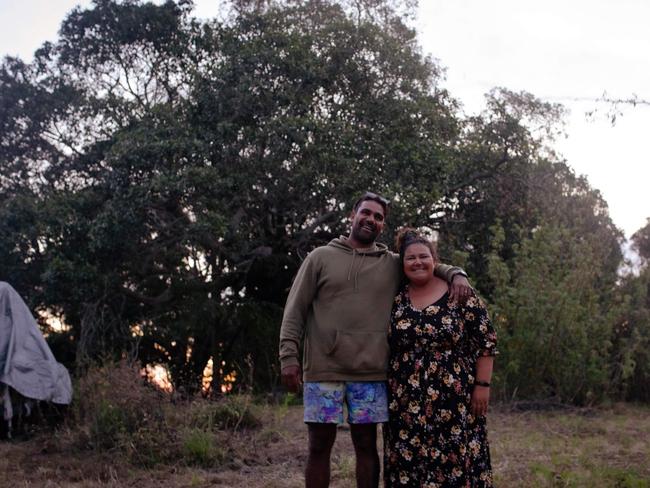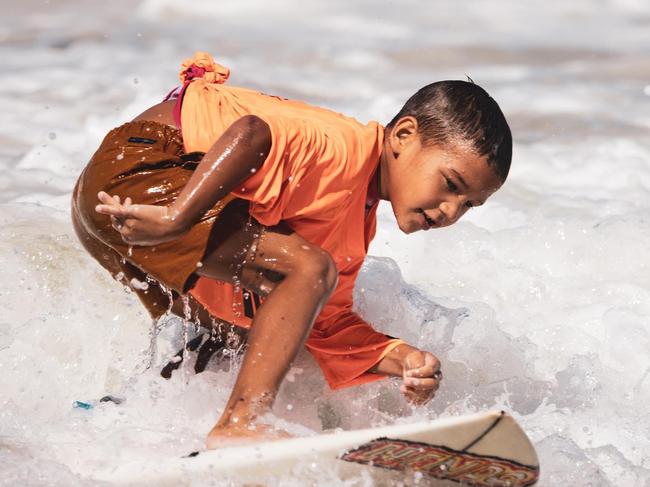Surf group Naru Goori Groms tackling youth mental health and suicide following tragic passing
Amber Hamer and James Mercy were rocked by the suicide of their dad - and they’re determined to save other families from the same heartache.
National
Don't miss out on the headlines from National. Followed categories will be added to My News.
When Amber Hamer and James Mercy lost their father Eric to suicide at a young age, they were left with the indelible memory of his love for surfing.
And the siblings were determined to find a way to honour the well known Aboriginal wave rider from Coffs Harbour, NSW — and help save another family from a similar heartache.
So, on the 20 year anniversary of their father’s passing in 2017, they founded Naru Goori Groms – a surfing group for young Indigenous people to learn about mental health and suicide prevention through surfing and “connection with the ocean”.
“Dad passed away when we were quite young, and as a young person it’s really quite hard to figure out how you want to honour or carry on someone’s legacy,” Mrs Hamer said.
“But as grown adults now we have the capacity and the passion to actually follow through with some things that are obviously dad’s but also our own.

“Naru comes from a Gumbaynggirr word, and we were gifted it by our father. He designed and shaped surfboards in the 1990s and we still use the original logo sometimes today.”
The group gathers across a number Coffs Harbour beaches, not only connecting Aboriginal people with the ocean and the sport of surfing, but also raising funds to support mental health services in the region.
“There’s a component of what we do that is “Ngiinda Darrundang Gaagal” which really means “thanking the ocean”.
“Acknowledging the ocean in a western sense is like “thank you” but when you take it back to language, it sort of means in a wraparound way “you fixed me”.
“So we think that the ocean is a way that people can fix themselves and fix each other and get connected.”
The organisation were one of nine Indigenous groups from across Australia named as finalists in this year’s Indigenous Governance Awards, with the winners to be announced at Sydney’s ICC on Wednesday night.

Normally held every two years, this is the first time the awards have taken place in four years due to the pandemic.
This year’s finalists from the across the country recognise the contribution of Indigenous groups across a number of industries including health, community services, economic development, education and land rights.
More than 300 people – including politicians, Aboriginal and Torres Strait Islander leaders, corporate partners and community members – attended the gala dinner at the ICC, Sydney, on Wednesday night.
Among the guests were representatives from the nine finalist organisations, who travelled from five states and territories.
Naru Goori Groms were a finalist in the outstanding examples of governance in Indigenous-led small to medium incorporated organisations, but the Brewarrina Local Aboriginal Land Council were named the winners in the category.
“After the unavoidable disruptions and postponements throughout the past two years, it’s our honour and privilege to showcase these finalists and their stories of uncompromising strength and resilience,” CEO of Reconciliation Australia Karen Mundine said.
Judging panel co-chairs Dr Eddie Cubillo and Janine Mohamed, chief executive officer at the Lowitja Institute, praised the “unwavering leadership, tenacity and cultural pride: displayed by all the applicants.
“The finalists model standards that other organisations can observe and build on, and that will help to advance First Nations peoples in Australia and internationally,” Dr Cubillo said.
“On reflection I obviously have a lot of “why” and “what if” questions about my own father’s journey and I wish that was something available for him or that he was comfortable to actually reach out and have those hard conversations,” Mrs Hamer said.
“Dad, when he was around, wanted to create a space for people to be aware of and to take into consideration other ways to keep yourself good, keep yourself connected and keep yourself in your community.
“I feel it’s a great way to honour our father’s legacy, but also the community that we’re involved in and to think about the next generations because whether we like it or not we’re setting an example.”
Indigenous Governance Award Winners 2022
Outstanding examples of Governance in Indigenous led non-incorporated initiatives.
The Aboriginal Health & Medical Research Council (AH&MRC) Human Research Ethics Committee based in Sydney
The AH&MRC is the peak body for Aboriginal controlled health services in NSW and the Ethics Committee helps ensure that Aboriginal people are at the centre of Aboriginal health research.
“The Ethics Committee helps ensure that Aboriginal people are at the centre of Aboriginal health research, and provides an Aboriginal lens to make sure that research is conducted ethically and in a culturally safe way,” Committee co-chair, Dr Summer May Finlay said.
Outstanding examples of governance in Indigenous-led small to medium incorporated organisations
Brewarrina Local Aboriginal Land Council (Brewarrina, NSW)
In pursuit of social justice, the council aims to support the local Aboriginal community as it seeks the right to a distinct status and culture, the right to self-determination, and the right to land.
“Cultural preservation of our land and our environment is the first priority of business for our local Aboriginal Land Council. That sets the platform for very strong governance,” chairman David Kirby said.
Outstanding examples of governance in Indigenous-led large incorporated organisations
Wungening Aboriginal Corporation, Perth WA
Wungening provides culturally secure, confidential health, housing and healing services to Aboriginal people in the Perth metro area, working from the understanding that historical factors impacting on Aboriginal healing, health and wellbeing are key to healing spirit, mind and body.
“The Wungening way is really about connecting, and keeping our families connected, so that families can have culture handed down, and that we can really live with a strong community, strong families, and strong individuals,” Wungening CEO, Daniel Morrison said.
The 2022 finalists by category:
Outstanding examples of governance in Indigenous-led non-incorporated initiatives:
- Aboriginal Health & Medical Research Council Human Research Ethics Committee (Sydney, NSW)
- Strengthening of the Koling wada-ngal Committee to Support Community In The West (Wyndham, VIC)
- SAWCAN (South Australian West Coast ACCHO Network) (Adelaide, SA)
Outstanding examples of governance in Indigenous-led small to medium incorporated organisations (under $1 million annual revenue)
- Brewarrina Local Aboriginal Land Council (Brewarrina, NSW)
- Mudjar Aboriginal Corporation (Esperance, WA)
- Naru Goori Groms (Coffs Harbour, NSW)
Outstanding examples of governance in Indigenous-led large incorporated organisations (over $1 million annual revenue)
- Arnhem, Northern and Kimberley Artists Aboriginal Corporation (Darwin, NT)
- Robe River Kuruma Aboriginal Corporation (Karratha, WA)
- Wungening Aboriginal Corporation (Perth, WA)





